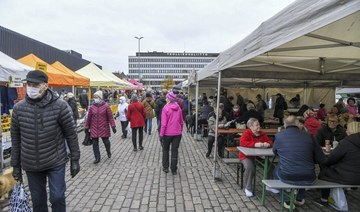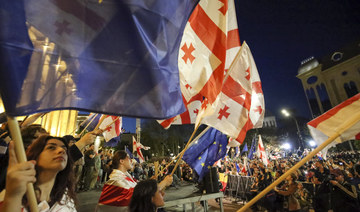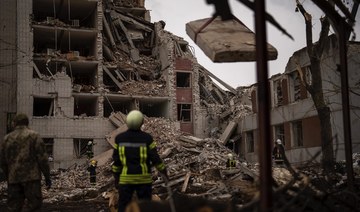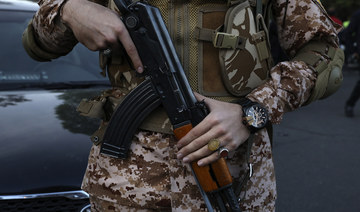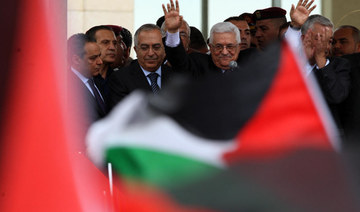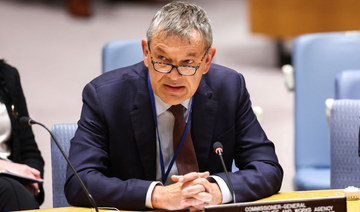HELSINKI: At home in the Finnish capital, Ilona Taimela scrolls through hundreds of WhatsApp chats with her former pupils — pictures of animals, maths sums and simple sentences in English and Finnish.
The teacher last year gave lessons to Finnish children imprisoned some 3,000 kilometers (1,800 miles) away in Syria’s Al-Hol displacement camp — using only the messaging app.
Al-Hol is a sprawling tent
city housing around 60,000 people, mainly women and children displaced by the US-backed battle to expel the Daesh group from war-torn Syria.
Among them are thousands of children of foreign mothers who traveled to Syria to be the wives of Daesh fighters.
“Some of the children didn’t know what a building is, what a house is, because they’ve always been in a tent,” Taimela told AFP.
“There was so much that they needed to learn.”
Rights observers warn the camp’s children are under constant threat from violence, poor sanitation and fires.
“It’s a miserable place, it’s out of control,” said Jussi Tanner, Finland’s special envoy charged with ensuring the fundamental rights of the Finnish children in Al-Hol, including access to health care and schooling, and eventual repatriation.
Extremist propaganda “is free to roam with no counter-messaging,” he said.
Tanner had the idea of offering lessons by phone to Al-Hol’s Finnish children when schoolchildren everywhere moved to distance learning at the start of the coronavirus pandemic.
With the help of Finland’s Lifelong Learning Foundation, officials engaged Taimela, a specialist in teaching Finnish kids abroad, and another teacher, to design and teach a curriculum.
With phones banned in the camp, the lessons would have to be in secret, and the politically sensitive project was also to be kept hidden from the Finnish public.
Tanner forwarded details about the voluntary classes to the mothers.
“That same day ... we got maybe eight children,” Taimela said.
Soon 23 of around 35 Finnish children in the camp had signed up.
“Good morning! Today is Thursday May 7, 2020. The first day of distance school!“
Taimela’s first message to the children included a smiling selfie.
“The sun is shining here in Finland. What kind of weather is it there?“
Soon Taimela and her colleague were exchanging hundreds of text and voice messages a day with the children, who were taught one or two subjects a day.
“The little ones would always get Finnish, and the older ones would get geography or history, and some of them also wanted to learn English.”
Sending photos used too much data, so the teachers relied on emojis, but soon realized there were no symbols for mathematical fractions or the ubiquitous Finnish blueberry.
“During the year the blueberry [emoji] arrived, so we were happy,” Taimela says, laughing.
Despite only knowing scant details about the children, Taimela said she and her colleague were “worried all the time about their welfare.”
“Especially when we heard that they were sick, or there was a storm and the tent had collapsed.”
Communication with some families would periodically stop.
“Some of them escaped the camp,” special envoy Jussi Tanner says, “so they were actually taking part in the school while on the run in northwestern Syria in an active conflict zone.”
Others were suddenly repatriated and left the group for good.
After months of lessons, the mother of one six-year-old revealed her daughter could now read.
“Not all six-year-olds in Finland can do that,” Taimela says, smiling. “It was a eureka moment.”
Daesh fighters declared a “caliphate” in large parts of Syria and neighboring Iraq in 2014, three years into Syria’s civil war.
Taimela says she feels “sadness rather than anger” toward the mothers who led their children into the conflict.
Many were vulnerable and believed the promises of militants that they would live in some “kind of paradise.”
But several military offensives whittled away at the brutal Daesh proto-state, until in 2019 Syrian Kurdish forces declared it defeated.
Reluctant Western nations have since brought home handfuls of their Daesh-linked nationals, mostly children.
Taimela had accepted that she would never know what happened to the repatriated children she had taught, but one day she was called to a reception center in Finland.
“It was an emotional few hours” meeting some of her pupils face to face for the first time, she said.
They “came very close” and Taimela read to them.
“I just wanted to know, ‘How is everything, what can I help with?’,” she said.
Finland’s foreign ministry has now repatriated 23 children and seven adults.
Tanner told AFP that only around 15 “harder-to-reach” individuals, of whom 10 are children, remain in camps in Syria.
The issue originally proved divisive in Finland, but opposition has “become much more muted.”
Taimela’s teaching drew to a natural close in mid-2021 and the ministry later made the project public.
She is now looking at how to use the innovative teaching model in other crisis zones or camps, and has received requests regarding Greece, Myanmar and Colombia.
“The Al-Hol teacher, that’s my label now,” Taimela smiles.
“But I’m proud of what we did.”
Finland’s secret school for children of Daesh fighters in Iraq
https://arab.news/63mkd
Finland’s secret school for children of Daesh fighters in Iraq
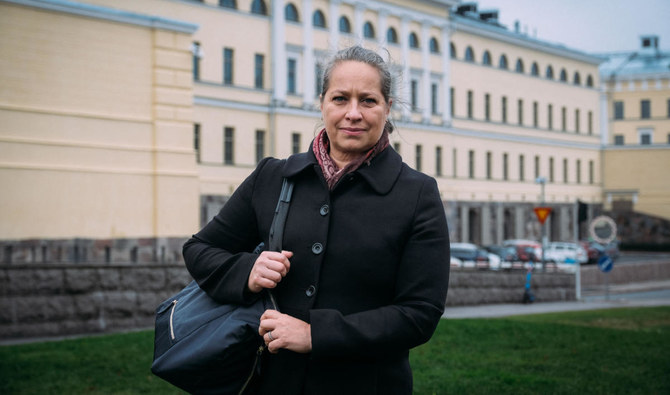
Germany holds 2 over military base attack plot for Russia
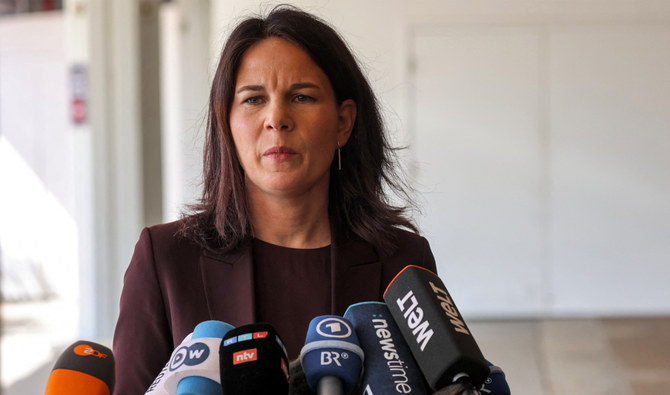
- NATO working on more air defenses for Ukraine, Stoltenberg says
BERLIN: Two German Russian nationals have been arrested in Germany on suspicion of plotting sabotage attacks, including on US military facilities, in what officials called a serious effort to undermine military support for Ukraine.
Authorities have searched the homes and workplaces of the two suspects who stand accused of working for a foreign secret service. One of them, identified as Dieter S., had since October 2023 discussed possible plots with a person linked to the Russian secret service, prosecutors said on Thursday.
Germany has become one of Kyiv’s biggest suppliers of military aid since Russian President Vladimir Putin ordered a full-scale invasion of Ukraine in February 2022, and is a major target for Russian spying operations, authorities have said.
“The suspicion that Putin is recruiting agents from us to carry out attacks on German soil is extremely serious. We will not allow Putin to bring his terror to Germany,” Foreign Minister Annalena Baerbock said.
Germany summoned the Russian ambassador over the arrests. Earlier, the Kremlin said it had no information about the issue.
Dieter S. had been prepared to carry out bomb and arson attacks on military facilities, including those operated by US forces, prosecutors said, adding that he took photos and videos of military transport and equipment.
A second person, Alexander J., began helping him from March at the latest, prosecutors said.
According to Spiegel magazine, the facilities included the Grafenwoehr army base in the southern state of Bavaria where Ukrainian soldiers receive training to use US Abrams tanks.
US, allied and partner training missions at Grafenwoehr, including the training of Ukrainians, continue, a US military spokesperson said, but referred inquiries about the arrests to the German authorities.
The prosecutors suspect Dieter S., whose last name has not been disclosed due to German privacy laws, was a fighter for Russian-backed forces in eastern Ukraine from December 2014 to September 2016 in the self-proclaimed Donetsk People’s Republic.
He was in possession of a firearm, prosecutors said.
In a separate case, prosecutors last month charged an officer in Germany’s military procurement agency with attempting to pass secret information to Russian intelligence. News of Thursday’s arrests coincided with a surprise trip by German Economy Minister Robert Habeck to Ukraine.
Germany also issued an urgent appeal this week for countries to help shore up Ukraine’s air defenses as Russian forces continue to pound Ukrainian cities and infrastructure.
“We will continue to provide massive support to Ukraine and will not allow ourselves to be intimidated,” Interior Minister Nancy Faeser said.
Meanwhile, NATO is working to send more air defense systems to Ukraine, Secretary-General Jens Stoltenberg said, adding that delays in providing such aid were harming Kyiv’s efforts to resist Russia’s attacks.
“We have compiled data about the different air defense systems we have in NATO and focused on the Patriot systems. And we are working with allies to ensure that they redeploy some of their systems to Ukraine,” he said in Italy.
Cameron tells Netanyahu UK will not ban IRGC: Report
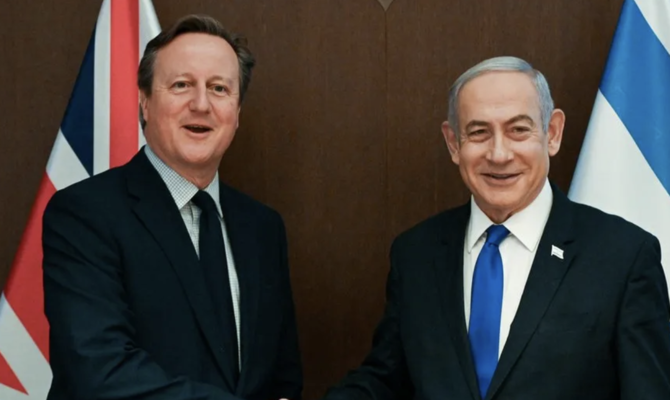
- Stance relayed during face-to-face talks between British FM, Israeli PM Wednesday
- ‘We need to be able to pick up the phone. If we proscribed them it would not help the situation’
LONDON: The UK will not proscribe Iran’s Islamic Revolutionary Guard Corps as a terrorist organization, the Daily Telegraph reported on Thursday.
The stance was reportedly relayed by UK Foreign Secretary David Cameron during a face-to-face meeting with Israeli Prime Minister Benjamin Netanyahu and Foreign Minister Israel Katz on Wednesday.
The Israeli government reportedly requested that the UK ban the IRGC following Iran’s drone and missile attack last week.
But Cameron, in what a source called a “blunt” response, told Netanyahu and Katz that doing so would hinder London’s ability to communicate with Tehran.
“We need to be able to pick up the phone. If we proscribed them it would not help the situation,” the source reported Cameron as saying.
If the IRGC were to be proscribed in the UK, it would make membership of it, attending its meetings, displaying its symbols or campaigning for it in the country illegal.
The move has been considered by the UK government for over a year, but Home Office officials have long warned that doing so would sever one of the few remaining diplomatic channels with Tehran. Instead, the IRGC has been sanctioned by the UK government on several occasions.
The US, which has banned the IRGC, has also suggested that the UK should proscribe it. The group’s navy was recently included in a new set of joint sanctions issued by London and Washington.
US vetoes widely backed Palestinian bid for full UN membership
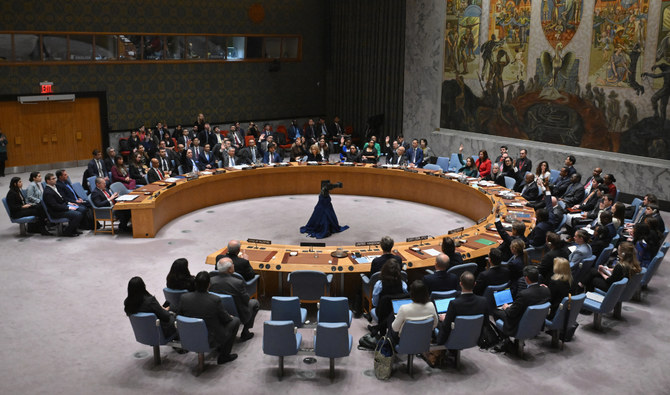
- 12 members of the Security Council vote in favor of the resolution, with the UK and Switzerland abstaining
- The representative of Palestinian President Mahmoud Abbas tells council his people long to live in freedom, security and peace ‘in an independent state’
NEW YORK CITY: The US on Thursday vetoed a draft resolution, drawn up by Algeria, that proposed the State of Palestine be granted full membership of the UN, thereby effectively blocking the Security Council from recognizing Palestine as a state.
Twelve members of the 15-member council voted in favor of the resolution, with the UK and Switzerland abstaining and the US voting against it. To pass, a council resolution requires at least nine votes in favor and no use of the power of veto by any of the five permanent council members: the US, the UK, France, Russia and China.
A spokesperson for the US State Department said on Thursday: “Premature actions in New York, even with the best intentions, will not achieve statehood for the Palestinian people.
“There are unresolved questions as to whether the applicant can meet the criteria to be considered as a state. We have long called on the Palestinian Authority to undertake necessary reforms to establish the attributes of readiness for statehood.
“Hamas, which is (a) terrorist organization currently exerting power and influence in Gaza, would be an integral part of the envisioned state, in this resolution. And for that reason, the United States is voting no on this proposed Security Council resolution.”
Robert Wood, the deputy representative of the US to the UN, had also reiterated that under his nation’s laws, full recognition by the UN of a Palestinian state would require that “funding would be cut off to the UN system, so we’re bound by US law.”
Prior to a previous meeting of the Security Council this month, Wood restated Washington’s long-held position that full Palestinian membership of the UN “is a decision that should be negotiated between Israel and the Palestinians … They need to work out an agreement and that’s how full membership should come about.”
Palestinian President Mahmoud Abbas submitted an application for UN membership in 2011. It was not considered by the Security Council but the following year the General Assembly granted the “State of Palestine” the more limited status of non-member observer state.
Algeria’s concise draft resolution text adhered to the typical format for Security Council resolutions suggesting a state be granted UN membership. It proposed that the Security Council, having examined the application by the State of Palestine for admission to the UN, recommend to the General Assembly that the State of Palestine be admitted as a full member.
The vote on Thursday followed a long day of high-level debate in the council chamber about the issue. UN Secretary-General Antonio Guterres opened the meeting by warning that the Middle East was “on a precipice,” and calling for “maximum restraint.”
He added that it is “high time to end the bloody cycle of retaliation. It is time to stop.”
He reiterated his condemnation of Iran’s attack on Israel this week, and of the latter’s attack on the Iranian consulate in Damascus this month.
“In Gaza, seven months of Israeli military operations have created a humanitarian hellscape,” said Guterres.
“Tens of thousands of people have been killed. Two million Palestinians have endured death, destruction and the denial of lifesaving humanitarian aid. They are now staring down starvation.
“An Israeli operation in Rafah would compound this humanitarian catastrophe,” he added, referring to threats by Israeli authorities of a ground offensive in the city in southern Gaza, which has become the last refuge for more than a million Palestinians displaced by fighting in other parts of the territory.
Ending the hostilities in Gaza would significantly help to defuse rising tensions across the region, Guterres said as he repeated his calls for an immediate humanitarian ceasefire and the release of all hostages being held in the territory.
Ziad Abu Amr, the representative of the Palestinian president, said his people long to practice their right to self-determination and to live in freedom, security and peace “in an independent state similar to other countries around the world.”
Addressing the US directly, he added: “To those who say that recognizing the Palestinian state must happen through negotiations and not through a UN resolution, we wonder once again, how was the State of Israel established? How was it recognized? Wasn’t that through a UN resolution, which is Resolution 181?
“It is high time for the Security Council to shoulder its historic responsibility and give justice to the Palestinian people by adopting a resolution to accept Palestine as a full member of the United Nations.”
Jordan’s foreign minister, Ayman Safadi, called on the Security Council to “accept the state of Palestine as a full-fledged member of the United Nations.”
He added: “Do so to uphold justice, to make peace triumphant, to reject injustice, to cry out against falsehood. Do not leave the future of the region in the hands of the most extremist elements of the Israeli government.”
Russia’s permanent representative to the UN, Vasily Nebenzia, said: “The minimum we’re compelled to do, based on all moral imperatives, is to satisfy Palestine’s aspiration for UN membership.
“We’re convinced that recognition of Palestine, on a status on a par with Israel, will help the long-term settlement of the Palestine-Israeli conflict.”
Spain’s foreign minister, Jose Manuel Albares Bueno, said his country has joined the 139 others that have already officially recognized the State of Palestine, and supports its admission to the UN.
“Spain will recognize the State of Palestine because the people of Palestine cannot be condemned to be a people of refugees,” he said. “Also because this is the way to peace in the Middle East, and because this is good for the security of Israel.
“Spain will recognize a Palestinian state because they have a right to a future with hope, just as the Israeli people have a right to a future in peace and security, and following so many decades of pain.”
Brazil’s foreign minister, Mauro Vieira, told council members that the “time has come for the international community to finally welcome the fully sovereign and independent state of Palestine as a new member of the United Nations.”
China’s ambassador to the UN, Fu Cong, called on members of the council “to take a responsible attitude in light of history and cast a favorable vote to support Palestine joining the UN family as a full member.”
Algeria’s foreign minister, Ahmad Attaf, said that full membership of the UN for Palestine is a “historical right,” and failure to grant it will guarantee the Arab-Israeli conflict is prolonged.
The UK’s representative to the UN, Barbara Woodward, said that recognition of a Palestinian state “cannot come at the start of the process but it does not have to be the very end of the process.”
She added: “Our long-standing position has been that we will recognize a Palestinian state at a time that is most conducive to the peace process. That pathway will start with fixing the immediate crisis in Gaza.”
After COVID, WHO defines disease spread ‘through air’
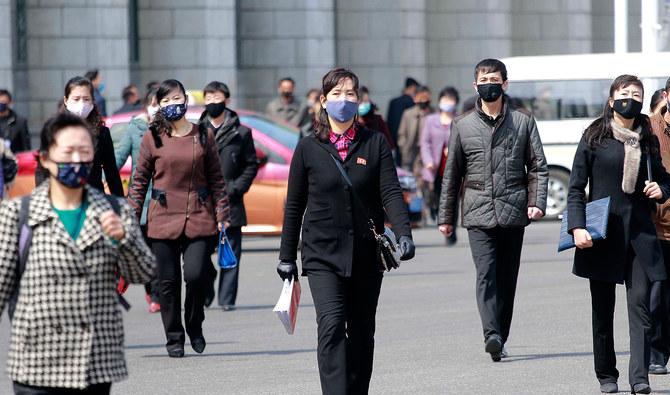
- Agencies have historically required high levels of proof before calling diseases airborne, which required stringent containment
- Past disagreements also centered around whether infectious particles were “droplets” or “aerosols” based on size
LONDON: The World Health Organization and around 500 experts have agreed for the first time what it means for a disease to spread through the air, in a bid to avoid the confusion early in the COVID-19 pandemic that some scientists have said cost lives.
The Geneva-based UN health agency released a technical document on the topic on Thursday. It said it was the first step toward working out how to better prevent this kind of transmission, both for existing diseases like measles and for future pandemic threats.
The document concludes that the descriptor “through the air” can be used for infectious diseases where the main type of transmission involves the pathogen traveling through the air or being suspended in the air, in line with other terms such as “waterborne” diseases, which are understood across disciplines and by the public.
Almost 500 experts contributed to the definition, including physicists, public health professionals and engineers, many of whom disagreed bitterly over the topic in the past.
Agencies have historically required high levels of proof before calling diseases airborne, which required very stringent containment measures; the new definition says the risk of exposure and severity of disease should also be considered.
Past disagreements also centered around whether infectious particles were “droplets” or “aerosols” based on size, which the new definition moves away from.
During the early days of COVID in 2020, around 200 aerosol scientists publicly complained that the WHO had failed to warn people of the risk that the virus could spread through the air. This led to an overemphasis on measures like handwashing to stop the virus, rather than focusing on ventilation, they said.
On Wednesday, Democrats in the Arizona state House failed to repeal a controversial ban on abortion that dates back to 1864 after they couldn’t muster Republican support.
By July 2020, the agency said there was “evidence emerging” of airborne spread, but its then chief scientist Soumya Swaminathan – who began the process to get a definition – later said, opens new tab the WHO should have been more forceful “much earlier.”
Her successor, Jeremy Farrar, said in an interview that the new definition was about more than COVID, but he added that at the beginning of the pandemic there was a lack of evidence available and experts including the WHO acted in “good faith.” At that time, he was head of the Wellcome Trust charity and advised the British government on the pandemic.
Farrar said getting the definition agreed among experts from all disciplines would allow discussions to begin about issues such as ventilation in many different settings, from hospitals to schools.
He compared it to the realization that blood-borne viruses like HIV or hepatitis B could be spread by medics not wearing gloves during procedures.
“When I started out, medical students, nurses, doctors, none of us wore gloves to take blood,” he told Reuters. “Now it is unthinkable that you wouldn’t wear gloves. But that came because everyone agreed on what the issue was, they agreed on the terminology… [The change in practice] came later.”
Reuters photographer wins World Press Photo of the Year with poignant shot from Gaza
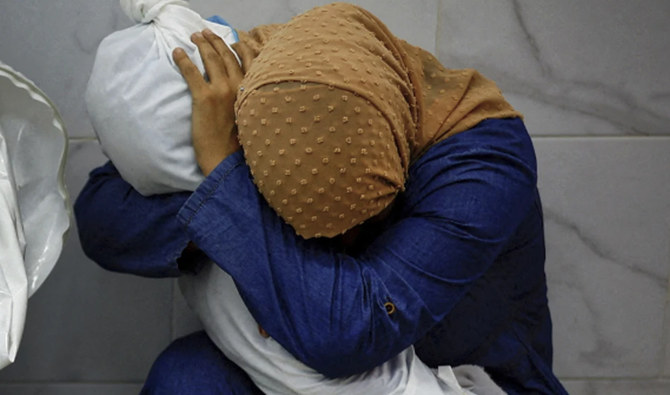
- Mohammed Salem won for heartrending photo of a Palestinian woman cradling the body of her young niece
- Inas Abu Maamar holds five-year-old Saly, killed along with her mother and sister when Israeli missile struck their home
PARIS: Reuters photographer Mohammed Salem captured this year’s prestigious World Press Photo of the Year award Thursday with a depiction of loss and sorrow in Gaza, a heartrending photo of a Palestinian woman cradling the body of her young niece. The photograph, taken in Khan Younis just days after Salem’s own child was born, shows 36-year-old Inas Abu Maamar holding five-year-old Saly, who was killed along with her mother and sister when an Israeli missile struck their home.
Salem, who is Palestinian, described this photo filed Nov. 2 last year, as a “powerful and sad moment that sums up the broader sense of what was happening in the Gaza Strip.”
The image ”truly encapsulates this sense of impact,” said global jury chair Fiona Shields, The Guardian newspaper’s head of photography. “It is incredibly moving to view and at the same time an argument for peace, which is extremely powerful when peace can sometimes feel like an unlikely fantasy,” she added.
The World Press Photo jury praised the shot’s sense of care and respect and its offering of a “metaphorical and literal glimpse into unimaginable loss.”
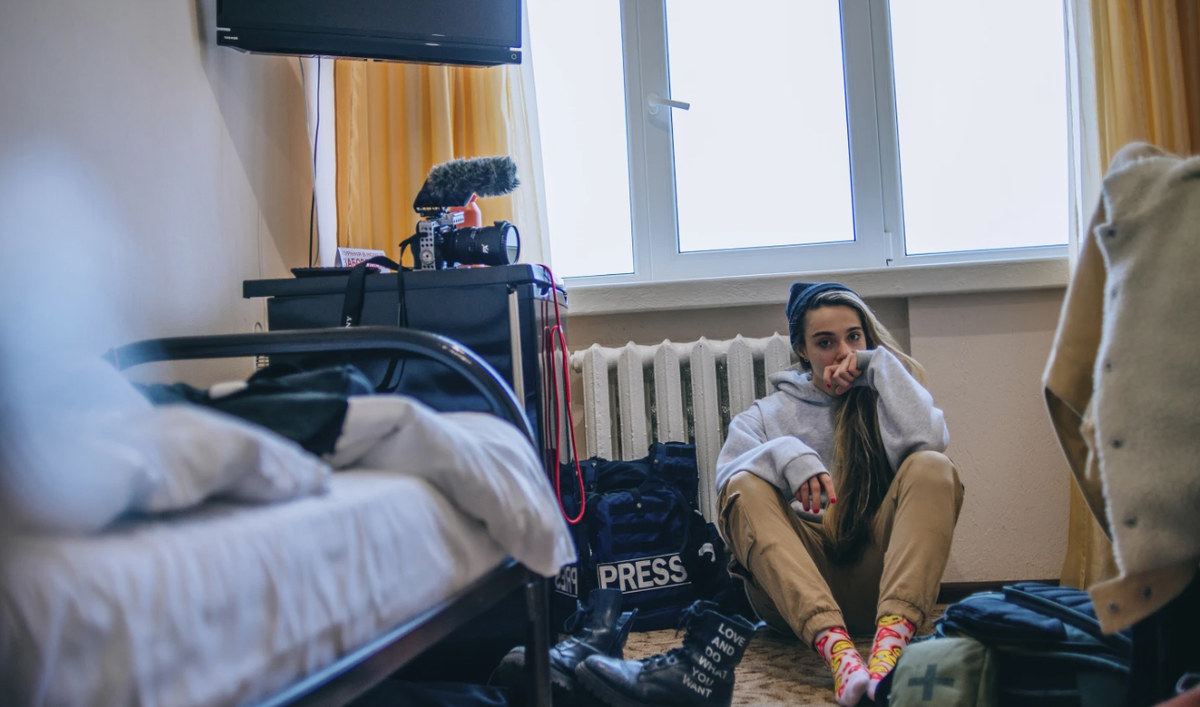
This is not the first time Salem has been recognized for his work on the Israeli-Palestinian conflict; he received a World Press Photo award more than a decade ago for another depiction of the human toll of conflict in the Gaza strip.
In the three other global categories announced Thursday, South Africa’s Lee-Ann Olwage won Photo Story of the Year for her touching series “Valim-babena,” featured in GEO magazine. The project focused on the stigmatization of dementia in Madagascar, a topic she explored through intimate portraits of “Dada Paul” and his family. Lack of public awareness surrounding dementia means that people displaying symptoms of memory loss are often stigmatized.
In the series, “Dada Paul,” who has lived with dementia for 11 years, is tenderly cared for by his daughter Fara. One of the standout images in the series shows him preparing for church with his granddaughter Odliatemix, capturing moments of normalcy and warmth amidst the challenges of dementia.
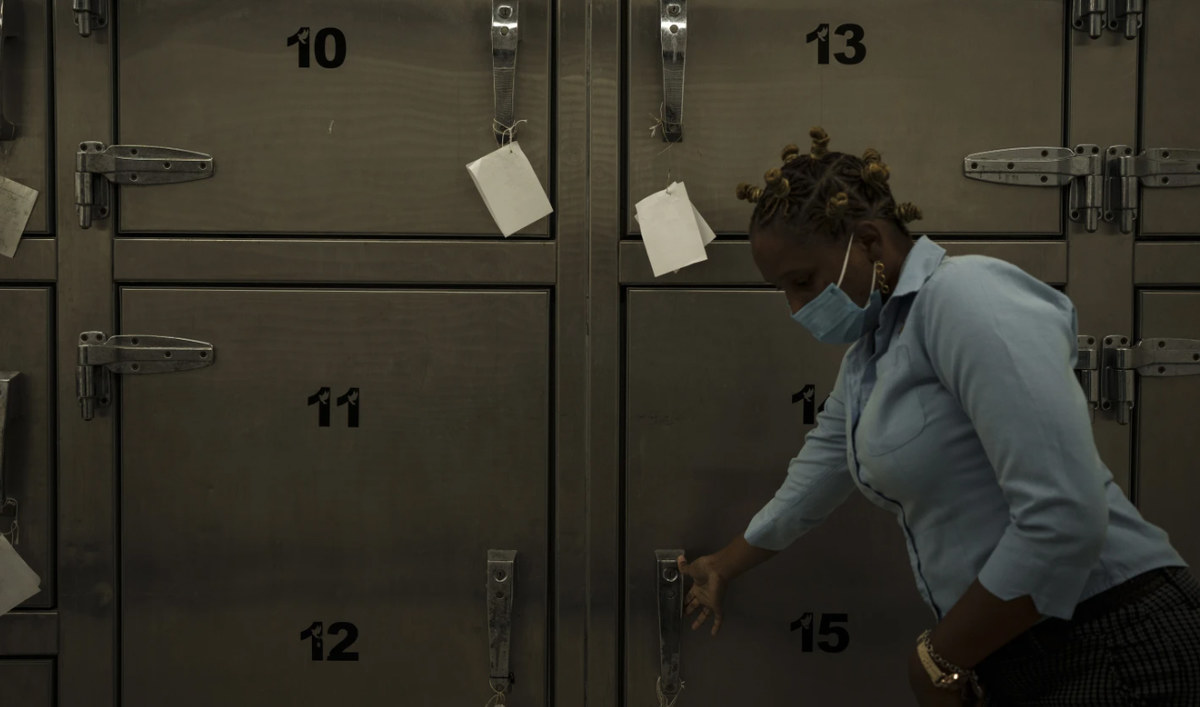
Photographer Alejandro Cegarra, a Venezuelan native who migrated to Mexico in 2017, won the Long-Term Project award for “The Two Walls,” published by The New York Times and Bloomberg. Cegarra’s project, initiated in 2018, examines a shift in Mexico’s immigration policies, which have moved from being historically open to enforcing strict regulations at its southern border. The jury said the photographer’s perspective as a migrant gave it a “sensitive,” human-centered perspective, according to a press release.
Julia Kochetova of Ukraine won the Open Format award for “War Is Personal.” The project stood out from coverage of the ongoing conflict by offering a personal look at the harsh realities of war. On a dedicated website, she merged traditional photojournalism with a diary-like documentary style, incorporating photography, poetry, audio clips and music.
The Associated Press won the Open Format award in the regional Africa category with the multimedia story “Adrift,” created by journalists Renata Brito and Felipe Dana. The story investigates the fate of West African migrants who attempted to reach Europe via a treacherous Atlantic route but ended up on a ghost ship discovered off Tobago. The team’s compelling use of photography, cinematography and detailed narrative, enhanced by expert design and multimedia elements, highlights the perils faced by migrants and the human stories behind global migration issues.
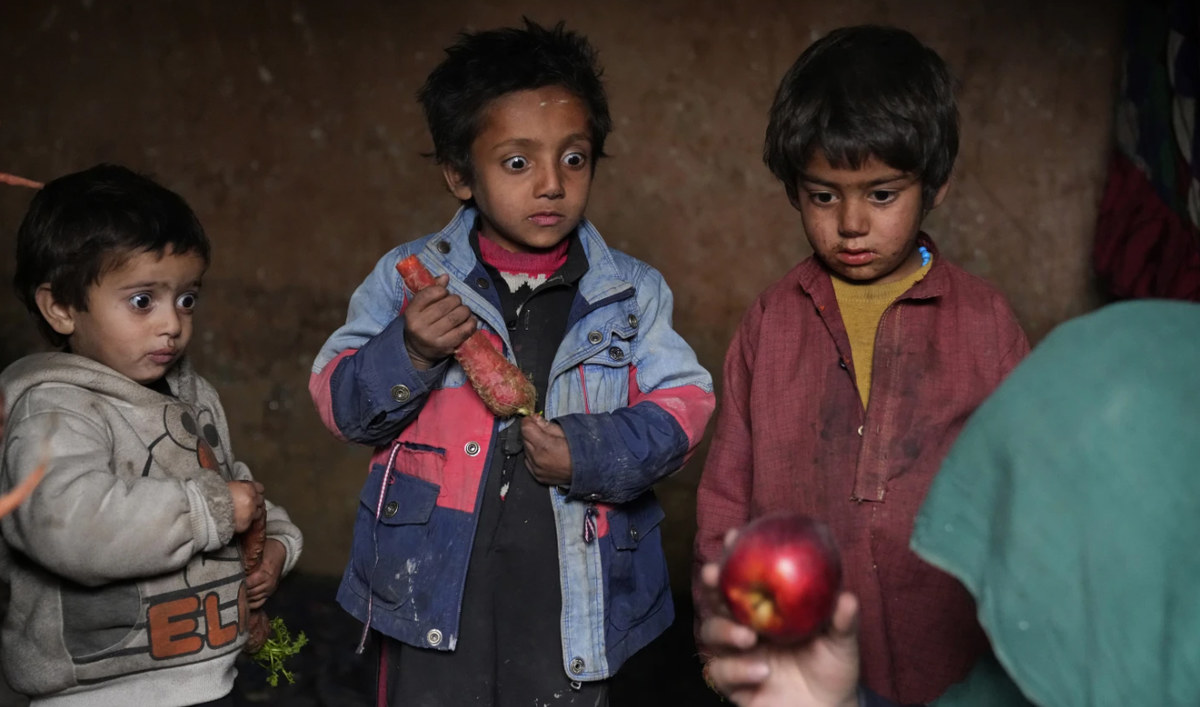
The Associated Press’ Ebrahim Noroozi won the Asia Stories award for his series “Afghanistan on the Edge,” which documents the country since the Taliban took over in August 2021.
World Press Photo is an independent, nonprofit organization based in the Netherlands, founded in 1955.




